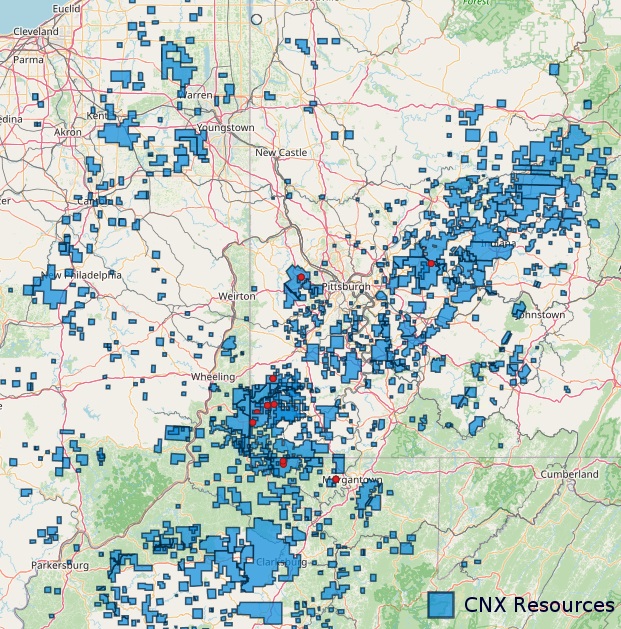
Appalachia gas producer CNX Resources owns leasehold in Somerset County, Pennsylvania (pictured). (Source: CNX, Shutterstock)
CNX Resources and other Appalachia producers are pushing out well completions and slashing production with natural gas prices near historic lows.
Canonsburg, Pennsylvania-based CNX Resources will defer completions on three Marcellus Shale pads, consisting of 11 wells, due to near-term challenges in the natural gas market, the company disclosed to investors last month.
The company lowered its spending outlook by $50 million in response to the deferral decision. CNX also slightly lowered its full-year production forecast from 580 Bcfe (approximately 1.58 Bcfe/d) to 550 Bcfe (approximately 1.5 Bcfe/d).
In order to return to its original guidance of 580 Bcfe, CNX would need to invest that $50 million in deferred well capital in early 2025, CNX said in first-quarter earnings on April 25.
“However, we will continue to monitor natural gas prices as we move into 2025 and will adjust capital activity levels to reflect the best possible capital allocation decision at that time,” the company said in prepared remarks. “In other words, we will continue to follow the math.”
CNX’s first-quarter production averaged 1.54 Bcfe/d (140.4 Bcfe total).

CNX still anticipates generating $300 million in free cash flow in 2024, despite lower gas prices on unhedged volumes and decreased production.
The deferral in capital spending, and stronger fundamentals supporting NGL prices, are expected to largely offset the declines, the company said.
During the first quarter, CNX drilled 14 Marcellus wells with an average lateral length of about 16,500 ft; That included a five-well pad with average laterals of 19,700 ft.
Four planned Marcellus turn-in-lines came in ahead of schedule, supporting CNX’s quarterly output of 140.4 Bcfe.
CNX plans to bring online three deep Utica Shale wells in Westmoreland County, Pennsylvania, that were drilled last year.
“We are excited to be the leaders in deep Utica Shale development, and we expect that we will have more detailed results to share with investors in the second half of 2024,” the company said in prepared remarks.
Other major producers in Appalachia are adjusting their spending and drilling in response to the challenging price environment.
Pittsburgh-based EQT Corp. is prioritizing gas curtailments and its divestiture program, but remains bullish on future gas demand stemming from LNG exports and AI data centers.
EQT’s updated 2024 production outlook ranges between 2.1 Tcfe and 2.3 Tcfe, including non-operated gas curtailments and deferred well completions.
And the company got a head start on its divestiture program through an Appalachian asset swap with Equinor earlier this month.
Range Resources is also pushing back completions for certain dry gas wells in Appalachia into the back half of the year, the Fort Worth-based E&P said in first-quarter earnings.
Low prices are affecting producers outside of Appalachia, too: Chesapeake Energy, with positions across Appalachia and the gassy Haynesville Shale, is curtailing production and slashing new drilling.
Private Haynesville producer Aethon Energy also confirmed cutting rig activity on its acreage in East Texas and northern Louisiana.
RELATED
Permian NatGas Hits 15-month Low as Negative Prices Linger
Contango watch
U.S. gas producers have languished through several quarters of low prices—a market further depressed by near-record volumes of associated gas flowing from oily plays, including the Permian Basin and the Bakken, where shale oil production is booming.
It’s a far cry from 2022, when Russia’s invasion of Ukraine and global economic recovery from COVID-19 fueled a significant supply-demand imbalance, forcing natural gas prices sky high.
Henry Hub spot prices averaged $6.67/Mcf in 2022, according to U.S. Energy Information Administration data.
But prices fell by 60% to average at $2.63/Mcf in 2023 due to increased production, elevated storage inventories and mild winter weather.
But operators and experts by and large expect natural gas prices to increase into 2025 and beyond as a wave of new LNG export projects tick online along the U.S. Gulf Coast.
Experts also anticipate a surge in gas-focused M&A activity in Appalachia, the Haynesville and other regions as the gas macro environment improves.
Most of the high-profile dealmaking in the energy sector has focused on oily assets—primarily in the Permian Basin of West Texas and southeastern New Mexico.
The market for gas-focused M&A has moved much slower; With Henry Hub prices hovering near record lows, many would-be sellers haven’t been willing to ink a deal.
But the chilled natural gas M&A market shows signs of thawing.
Chesapeake and Southwestern Energy are combining in an $7.4 billion merger and are poised to overtake EQT as the nation’s largest gas producer.
In the Haynesville, Rockcliff Energy II sold to Tokyo Gas Co. and partner Castleton Commodities in a $2.7 billion deal late last year.
Several gassy properties are also being shopped around the Haynesville, including notable packages from Chevron and Tellurian.
RELATED
Recommended Reading
Phillips 66’s NGL Focus, Midstream Acquisitions Pay Off in 2024
2025-02-04 - Phillips 66 reported record volumes for 2024 as it advances a wellhead-to-market strategy within its midstream business.
Pinnacle Midstream Execs Form Energy Spectrum-Backed Renegade
2025-02-03 - Renegade Infrastructure, led by Permian-centric Pinnacle Midstream developers Drew Ward and Jason Tanous, have received a capital commitment from Energy Spectrum Partners.
Argent LNG, Baker Hughes Sign Agreement for Louisiana Project
2025-02-03 - Baker Hughes will provide infrastructure for Argent LNG’s 24 mtpa Louisiana project, which is slated to start construction in 2026.
Williams Cos. COO Dunn to Retire
2025-03-13 - Williams Cos. COO Micheal Dunn was crediting with helping the company focus on a natural gas strategy.
CPP Wants to Invest Another $12.5B into Oil, Gas
2025-03-26 - The Canada Pension Plan’s CPP Investments is looking for more oil and gas stories—in addition to renewable and other energies.
Comments
Add new comment
This conversation is moderated according to Hart Energy community rules. Please read the rules before joining the discussion. If you’re experiencing any technical problems, please contact our customer care team.






